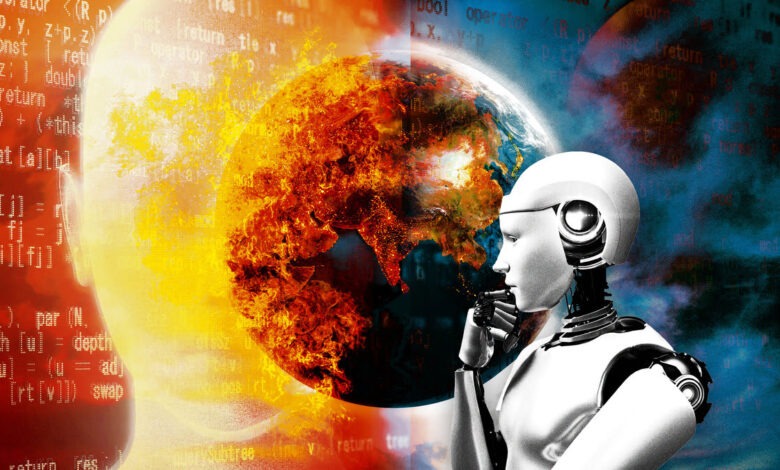
Giulio Boccaletti
Special to The Times Kuwait
We have just witnessed the start of a paradigm shift in earth science. A paper published in Nature in July showed that a neural network (artificial intelligence) predicted weather better than the European Center for Medium-Range Weather Forecasts, which has the world’s most advanced forecasting system. Then, in November, Google’s DeepMind announced that its weather-forecasting AI had produced even stronger predictions.
The traditional approach to weather forecasting is to use observations taken at a point in time as initial conditions for equations based on physical principles. By contrast, an AI will ingest data collected over long periods of time and then ‘learn’ the dynamics that traditional equations must describe explicitly. Both the traditional and the AI-based method rely on supercomputers, but the AI has no need for formally developed theories.
Weather forecasting matters; it determines when and where planes fly, which routes ships take, and helps manage all manner of civilian and military risks that come with a variable environment. While these are still relatively early days for AI applications in this field, and much still needs to be worked out, as in other sectors, AI-driven forecasting may displace skilled labor, since neural networks do not require knowledge of dynamical meteorology (the authors of the Nature paper are engineers with no such background). But the implications hardly stop there.
Writing about the problem of statistical forecasting in the 1950s, Norbert Wiener, the father of cybernetics, pointed out that if we already know the history of a system that exhibits certain properties, adding knowledge of the equations that govern its dynamics will not necessarily improve our predictions. Wiener was making a largely theoretical point, because limitations in observations, data, computing power, and other factors allowed for nothing else at the time. But now, his argument strikes at the heart of the matter, capturing the broader implications of recent advances in AI.
Just in the last few years, we have vastly increased our observational data of Earth. Between 1993 and 2003, just 25 Earth-observing satellites were launched into space; but between 2014 and 2022, the number shot up to 997, bringing the total fleet of Earth-observing and other satellites currently in orbit to some 7,560. With a vast space infrastructure that beams down data on just about anything — from plant growth, water vapor, and infrastructure installations, to infrared radiation, canopy height, and measurements of the state of the atmosphere — we have entered a golden age of Earth observation.
This growing archive of data describes almost everything that both we and nature do on Earth. When combined with new AI models and our ever-expanding computational infrastructure, it could upend our understanding of the planet and our role on it.
Consider climate change. For the last 40 years, humanity’s response to the climate crisis has been guided by the Intergovernmental Panel on Climate Change, a scientific body that is compartmentalized by discipline: the physical sciences use large Earth system models that have much in common with those used in weather forecasting, while, separately, economists and geographers quantify the impact and focus on the role of adaptation and mitigation policies on our societies.
This division of labor — reflected in the IPCC’s tripartite working groups — corresponds with a division in methodologies. While physics-based Earth system models follow from first-principles equations, economists and impact modelers use a portfolio of empirical methods and irreducible theories.
AI could disrupt all of this. While it is unlikely to supplant traditional climate modeling completely — our observational record is not long enough to offer a statistically abundant picture of climate phenomena over the centuries — it is already playing an important role in the field.
More to the point, what matters most to us is not how the climate system behaves but how it affects the world we and other creatures live in. AI models, being agnostic to any current scientific theories or disciplinary paradigms, could help us infer and possibly predict how biomass on the landscape changes over time. That, in turn, could improve how we manage forests and agriculture, construct diagnostic tools and early-warning systems for fire or flood risk, understand how energy economics connects to these changes, or predict their effects on the broader economy and even on climate negotiations. And all of this would come on top of how AI can accelerate the transition to a low-carbon economy.
Of course, AI is no substitute for scientific understanding. Science will remain a quintessentially human pursuit, where the value lies more in asking the right question rather than just extracting an answer from data. Nonetheless, we should try to make the most of the epistemological shift that the rise of AI heralds. It can help us identify new observable phenomena that have thus far escaped disciplinary lenses. It can assist us in managing landscape-scale systems that are too complex to be susceptible to theorization. It is the ultimate exploratory instrument to break down disciplinary boundaries.
This shift also poses a profound policy challenge. The infrastructure driving it — Earth-observing satellites and computation — is increasingly controlled by the private sector. The single largest owner of Earth-observing satellites is a company called Planet Labs. High-tech companies, from IBM and Nvidia to DeepMind and Huawei are at the frontier of machine learning. With access to unparalleled capital and resources, these companies can easily outcompete most public research centers. Some can be quite philanthropic, but they ultimately have no obligation to deliver public goods or to worry about equitable access to their infrastructure.
As we grapple with the implications of the digital revolution and a natural environment that is changing before our eyes, AI may hold the key to unraveling some of the complexity that has exceeded our comprehension. But with the means of research firmly in private hands, policymakers will need to be vigilant to ensure that these new tools provide public goods, rather than just private benefits, and that the questions being asked of them produce answers that inform countries’ legitimate policy aims.
Of course, AI is no substitute for scientific understanding. Science will remain a quintessentially human pursuit, where the value lies more in asking the right question rather than just extracting an answer from data.

Scientific Director of the Euro-Mediterranean Center on Climate Change, he is the author of Water: A Biography.
Copyright: Project Syndicate
www.project-syndicate.org











